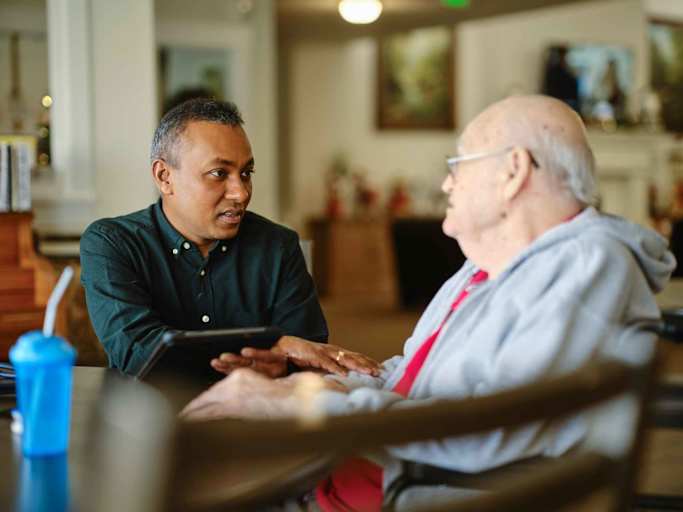Master’s in Counseling Psychology Program Guide
Wondering what you can do with a master’s degree in counseling psychology? Check out this guide to learn more about a master’s in counseling psychology.If you are interested in helping people improve their mental health and overall quality of life, earning a master’s degree in counseling psychology can lead to myriad career opportunities. Before you pursue a master’s in counseling psychology, find out what to expect from this degree and the careers available to graduates.
Degree Snapshot
- Typical Admission Requirements: Each counseling psychology master’s program establishes its own admission requirements. Most programs require a bachelor’s degree in psychology or a related field. Applicants typically provide official transcripts with cumulative GPA, letters of recommendation, a personal statement, and GRE scores.
- Time to Completion: Approximately 60 credits completed in 2-3 years
- Common Courses/Subjects: Advanced counseling theories and techniques; human development; group counseling; abnormal psychology and psychopathology; and diagnosis, assessment, and treatment
Why Get a Master’s Degree in Counseling Psychology?
Employment Opportunities
As more people seek help with their behavioral and emotional issues, mental health professionals of all kinds are in demand. While a bachelor’s in psychology can qualify you for entry-level positions, a master’s in counseling psychology leads to more advanced professional opportunities in an array of settings.Preparation for Doctoral Studies
A master’s degree provides a strong background for doctoral studies. Some counseling psychology doctoral programs award advanced standing to students with master’s-level training in counseling psychology, reducing the time needed to complete the degree.Licensure
Graduate training is a requirements for clinical practice. Most states require a doctorate to practice as a licensed clinical psychologist, but others award licensure to master’s degree-holders who have completed two years of supervised clinical experience.Personal and Professional Fulfillment
Counseling psychologists experience considerable fulfillment by helping people achieve a better quality of life, motivating them to overcome challenges, such as addictions, domestic violence, anxiety, and depression.Career Opportunities Outside the Field of Psychology
Besides careers in mental health, a master’s in counseling psychology can lead to professional opportunities in corporate, educational, and government settings in fields like human resources, marketing, and criminal justice.
Example Counseling Psychology Courses
A master’s in counseling psychology teaches students the knowledge and skills needed for effective counseling practice and prepares them to become licensed professional counselors. Not all counseling psychology master’s programs offer the same curriculum, but most offer similar coursework in counseling theory, methods, and practice. All programs feature supervised practicum experiences. In many programs, students have the option to take electives or concentrations in specialized areas, such as substance abuse counseling, trauma-informed counseling, and marriage and family therapy.
Common courses include:
- Counseling Theories and Practice: An introduction to the basic theories, principles, and procedures available to counseling psychologists using case studies that demonstrate applications in a variety of settings
- Psychopharmacology: An overview of the use of medications in counseling psychology, including indications and contraindications of psychopharmacological medications for the treatment of mental health and substance use conditions
- Human Development Through the Lifespan: An exploration of human development from infancy through adulthood, including current research and theories that address assessment and intervention with individuals who deviate from the normal course of development
- Multicultural Counseling: An examination of counseling practice from a multicultural perspective focusing on social and cultural identity issues, the nature of microaggressions, and how power and privilege affect the patient-counselor relationship
What Can You Do with a Master’s Degree in Counseling Psychology?
According to the U.S. Bureau of Labor Statistics, careers across the mental health field are projected to grow through 2032. Earning a master’s in counseling provides the knowledge and skills to enter these expanding career opportunities and to pursue licensure and specialized certifications.
With a master’s in counseling psychology, you can find a variety of employment opportunities in public and private environments, such as hospitals, community clinics, social service agencies, and corporate workplace settings. In many states, you can obtain master’s-level licenses to practice as a licensed marriage and family therapist or a licensed professional clinical counselor after completing a counseling psychology master’s and gaining work experience.
Career Advancement
A master’s degree in counseling psychology can broaden your options and boost your earning potential. According to the American Psychological Association, master’s degree-holders earn a median annual salary of $60,000 compared to $50,000 for those with only a bachelor’s degree.
Graduate Programs
A master of science degree focuses on research and the use of statistics and empirical evidence in counseling practice. A master of arts in counseling psychology places more emphasis on theoretical approaches and therapeutic applications. Both degrees prepare you for clinical practice and provide a strong foundation for doctoral studies.
If you are planning to earn a doctorate, consider whether your professional goals fit best with a Psy.D. program that trains you for advanced clinical practice or a Ph.D. program that focuses more on scientific inquiry and research.
Licensure
While a doctorate in counseling psychology is the generally accepted educational requirement to obtain a license and practice independently, licensure eligibility varies by state. For example, a doctorate in counseling psychology from an APA-accredited program can qualify you for licensure as a psychologist. In some states, a master’s and two years of supervised experience can qualify you for licensure in positions, such as professional counselor, mental health counselor, or substance abuse counselor.
Professional Organizations
- American Psychological Association: The APA offers membership to researchers, educators, clinicians, students, and consultants. Its mission is to advance the creation, communication, and application of research-based knowledge in psychology to benefit society by improving lives.
- American Counseling Association: As the world’s largest professional organization for counselors, the ACA provides its members with a variety of resources, including continuing education, networking opportunities, professional journals and newsletters, job listings, and a mentoring program.
- American Mental Health Counselors Association: The AMHCA promotes standards for training, licensure, and credentialing of clinical mental health professionals; advocates for mental health issues; and sponsors workshops, conferences, and publications.
Take the Next Steps
Graduate studies in counseling psychology can open up professional opportunities in an array of settings. Now that you know what to expect in a master’s degree in counseling psychology, make your next move to earn your degree.
Frequently Asked Questions About a Master’s Degree in Counseling Psychology
While a graduate degree serves as the minimum baseline requirement for licensure, you need a doctorate to practice as a counseling psychologist in most states. However, earning a master’s can qualify you for many counseling positions, including professional counselor, mental health specialist, and youth guidance counselor.



